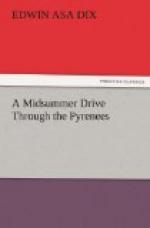* * * * *
“He did his right-hand glove uplift;
Saint Gabriel took from his hand the gift.
—Then drooped his head upon his breast,
And with clasped hands he went to rest.”
There is indeed little in epic poetry to surpass the high simplicity of this loving portrayal of a hero’s death.
It is the climax of the poem. The Emperor’s army burst upon the scene, frantic with anxiety; but no eye was open to give them greeting. Roland was dead with his slaughtered rear-guard, and lying with his face to the foe. For three days the sun stayed its motion, at Charlemagne’s frenzied petition, and the Moors were chased and cut to pieces, Saragossa taken,—a full and furious vengeance exacted. The whole army mourned for their companions; holy rites attended their stately burial; Ganelon was tried, condemned, torn to pieces by wild horses. But the joy of the Franks, their hero, their idol, was gone forever from them; retribution, even the bitterest, could count for little against the passing of that peerless spirit.
A pathetic meeting was afterward the old Emperor’s with Alva, the affianced of Roland:
“‘Where is my Roland, sire,’
she cried,
‘Who vowed to take me for his bride?’”
Brokenly at length he told her of the news. A moment she gazed at him unseeing:
“’God and his angels forbid,
that I
Should live on earth if Roland die!’
Pale grew her cheek,—she sank
amain
Down at the feet of Charlemagne.”
So let us leave this tender poem, tender unwontedly among its times; an epic which sincerely merits a vogue more near to its value.
CHAPTER V.
THE CITY OF THE ARROW-PIERCED SAINT;
We glide smoothly away from St. Jean de Luz and its legends, by the unlegendary railroad. The track curves southward, with frequent views of the coast, and it will be but a few minutes before we shall be in Spain. We instinctively feel for the reassuring rustle of our passports, duly vised at Bordeaux. The low mountain that overhangs Fuenterrabia, one of the nearest Spanish towns, comes closer, and soon the train whistles shrilly into the long station at Hendaye, the last French village, in great repute for its delicious cordial. It is on the edge of the Bidassoa, a placid, shallow river which here lazily acts as the international boundary. Irun, the first town of the peninsula, is across the bridge, and after a short delay the train crosses,—and we instantly feel a hundred miles nearer to the Escorial, a hundred years nearer to Philip and the auto-da-fe.
The change of nationality at these frontier towns is always distinct and surprising, and more so than elsewhere here in Irun. Within three minutes we have in every sense passed from France into Spain. Language not only, but the type of face and dress, have altered in a flash. We are not conscious, however, of any increased governmental surveillance; passports are not asked for at all, and the customs-official gives but a light inspection to trunk and satchels.




